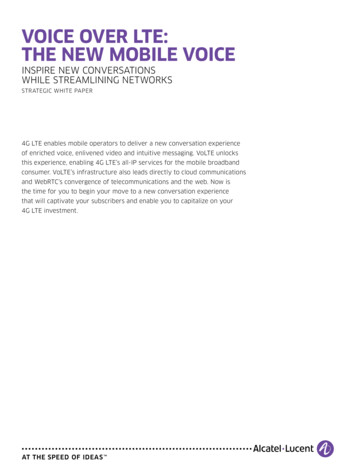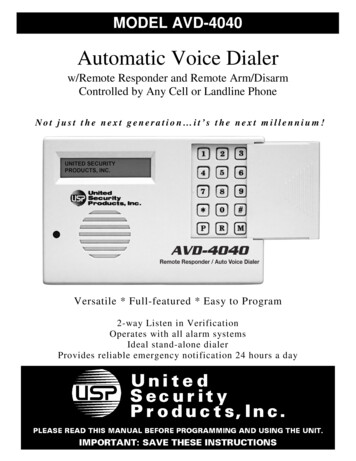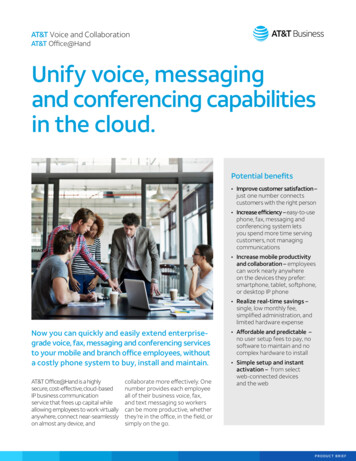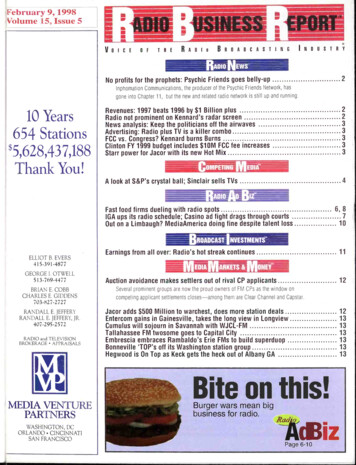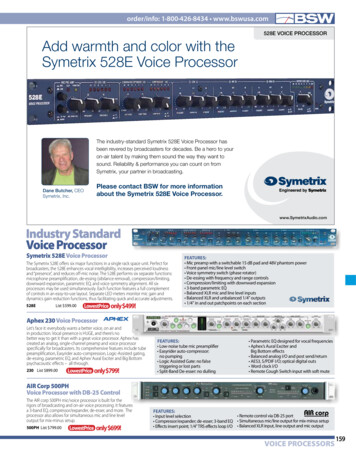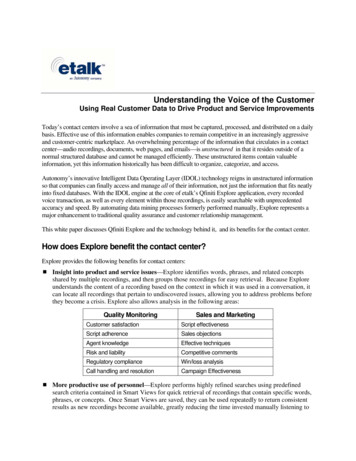
Transcription
Understanding the Voice of the CustomerUsing Real Customer Data to Drive Product and Service ImprovementsToday’s contact centers involve a sea of information that must be captured, processed, and distributed on a dailybasis. Effective use of this information enables companies to remain competitive in an increasingly aggressiveand customer-centric marketplace. An overwhelming percentage of the information that circulates in a contactcenter—audio recordings, documents, web pages, and emails—is unstructured in that it resides outside of anormal structured database and cannot be managed efficiently. These unstructured items contain valuableinformation, yet this information historically has been difficult to organize, categorize, and access.Autonomy’s innovative Intelligent Data Operating Layer (IDOL) technology reigns in unstructured informationso that companies can finally access and manage all of their information, not just the information that fits neatlyinto fixed databases. With the IDOL engine at the core of etalk’s Qfiniti Explore application, every recordedvoice transaction, as well as every element within those recordings, is easily searchable with unprecedentedaccuracy and speed. By automating data mining processes formerly performed manually, Explore represents amajor enhancement to traditional quality assurance and customer relationship management.This white paper discusses Qfiniti Explore and the technology behind it, and its benefits for the contact center.How does Explore benefit the contact center?Explore provides the following benefits for contact centers:Insight into product and service issues—Explore identifies words, phrases, and related conceptsshared by multiple recordings, and then groups those recordings for easy retrieval. Because Exploreunderstands the content of a recording based on the context in which it was used in a conversation, itcan locate all recordings that pertain to undiscovered issues, allowing you to address problems beforethey become a crisis. Explore also allows analysis in the following areas:Quality MonitoringSales and MarketingCustomer satisfactionScript effectivenessScript adherenceSales objectionsAgent knowledgeEffective techniquesRisk and liabilityCompetitive commentsRegulatory complianceWin/loss analysisCall handling and resolutionCampaign EffectivenessMore productive use of personnel—Explore performs highly refined searches using predefinedsearch criteria contained in Smart Views for quick retrieval of recordings that contain specific words,phrases, or concepts. Once Smart Views are saved, they can be used repeatedly to return consistentresults as new recordings become available, greatly reducing the time invested manually listening to
Understanding the Voice of the Customercalls. In addition, Smart Views can be refined by meta data in the recordings such as agent name,group, duration, ANI, DNIS and silence.Increased efficiency of performance analysis—Explore’s Audio Match function, accessed from themedia player, searches for specific words and phrases in a recording. The search criteria can bedefined in a Smart View or entered manually. The Audio Match interface displays the number ofoccurrences of each word and provides a timeline hyperlink that automatically moves the mediaplayer's play head to the location in the recording where the word or phrase occurred. This allowsusers to focus only on the parts of the recording that are important, greatly increasing the efficiency ofperformance analysis and coaching efforts.What is IDOL?Autonomy’s IDOL technology automatically processes and manages unstructured information. IDOL uses aunique combination of technologies that employ advanced pattern-matching techniques, Bayesian Inference,and Claude Shannon’s principles of information theory. These technologies identify patterns that naturally occurin language, based on the usage and frequency of words that correspond to specific ideas or concepts. Theprevalence of one pattern over another in a piece of unstructured information helps IDOL determine theprobability that the information is about a specific subject.The IDOL Server organizes all existing recordings into one or more clusters resulting from an automaticcategorization process that groups together information containing similar concepts. Clusters rank search resultsby conceptual similarity, which is essential to locating recordings that share the same relevance, even when therecordings contain different keywords.Within Qfiniti, IDOL extracts a recording’s digital essence and encodes the unique “signature” of the conceptscontained in the recordings. After the Qfiniti system records customer-agent voice transactions, IDOL executesan ingestion process that retrieves, analyzes, transcribes, and indexes the recordings to allow word/phrase-basedsearches, conceptual searches, and script adherence matches within Qfiniti Explore.Why is Explore better than the competition’s solutions?Most competitors’ speech analytics solutions are speech-to-text or phoneme-based, which reduces speechpatterns to the most basic phonetic elements to determine word and phrase matches. Autonomy’s IDOLtechnology builds on the phoneme-based approach by employing a fundamentally different and uniquecombination of technologies to enable computers to form a human-like understanding of unstructuredinformation. This allows Explore to identify and retrieve recordings based on the context of the subject matter,which provides access to a substantially larger pool of relevant information.How does Explore work?The prospect of gaining accurate and comprehensive insight into call trends using traditional search methods isslim because of the sheer volume of recordings involved. Because IDOL serves as the foundation for Explore’sbroad search capabilities, recordings are found based on concepts discussed. Explore’s conceptual searchexposes call trends by identifying recordings that share similar words, phrases, and concepts and then groupingthose recordings into distinct categories based on the top four concepts.When executing a conceptual search, Explore takes multiple snapshots of recordings at specific time intervalsand processes the contents of the recordings to identify shared words and concepts. These results can be loadedinto the media player for playback.Q81-0805A2
Understanding the Voice of the CustomerQfiniti Explore provides the following functionality:Smart View SearchAudio MatchAlertingScript AdherenceMulti-language SupportSmart View SearchPredefined and reusable search criteria is a fundamental requirement for retrieving information reliably andconsistently. Explore lets you define an unlimited number of Smart Views, each comprised of a uniquephoneme concept matrix containing specific words and phrases. Selecting a Smart View automatically searchesa designated set of recordings for matching words and phrases and displays the search results in Explore’s ViewList. To supplement or supplant the phoneme concept matrix, you can add to a Smart View one or moretraining recordings that serve as model recordings for the search. That is, when Explore executes the SmartView, it searches for recordings whose characteristics match those of the training recordings.Figure 1 – Smart View DefinitionSmart Views can also be refined by the use of metadata. Metadata consists of additional information the etalksystem stores about the recording. In Figure 1 the end users has selected to limit the results to a specific DNIS(number dialed by customer) and for calls longer than a specific duration. These additional criteria fieldsinclude:Q81-0805A3
Understanding the Voice of the CustomerAgent NameGroup NameANIDNISDuration of RecordingDuration of Silence in the RecordingNumber of HoldsRecording DateAudio MatchAn audio match search lets you locate specific words or phrases within a recording. Once you load a recordinginto Explore’s media player and execute the search, Explore identifies the exact points in a recording whenspecific words or phrases occur. The following example shows all points in the recording where the words“thank you” and “understand” were spoken. The Audio Matches window automatically displays search resultsfor words and phrases defined in the selected Smart View. You can also enter words or phrases manually withinthe Audio Matches window. Hyperlinks under each search result show the exact hour, minute, and second theword occurred in the recording. Clicking the hyperlink moves the media player’s play head to the correspondingpoint in the recording.Figure 2 – Audio MatchesAlertingTo expedite the delivery of time-sensitive information, Explore employs alert capabilities as new contentbecomes available. Smart Views can be defined to send results as an update to the user, allowing instantnotification for coaching, marketing or investigation. Alerting occurs through the use of SMTP messages forintegration with standard email delivery systems.Q81-0805A4
Understanding the Voice of the CustomerScript AdherenceThe conceptual searching for Explore also applies to scripts or commonly used verbiage within an industry.Agents use scripts for the following:Legal ComplianceCross Selling and Up SellingSale VerificationsA user can input a script and analyze the confidence that the concepts addressed in the script are identifiedin the recordings. If not, a user can select the acceptable threshold from the Script View and restrict theresults to that which falls below the selected threshold. A Script View is simply the inverse of a SmartView; Smart Views identify matching results whereas Script Views identify results that do not contain anacceptable amount of the queried script.Figure 3 – Script Adherence InputQ81-0805A5
Understanding the Voice of the CustomerLanguage SupportExplore has broad support for language in the contact center. There are two ways Explore works to ensure thatthe correct language is processed and that transcriptions identify concepts that may be unique to the customer.First, calls can be ingested in a variety of languages. The following is a partial list of languages supported byExplore:EnglishSpanishGermanMandarin ChineseFrenchSecond, the language model selected must be trained with industry specific words and phrases to build anunderstanding of the audio. Explore is equipped with an easy-to-use language model utility to update theselanguages with content stored in web pages, documents, manuals and plain text. For example, all of the textfrom a corporate website could be used to add product names and other jargon that is not a part of the standardmodel.ConclusionQfiniti Explore employs the power of Autonomy’s IDOL technology to provide access to unstructuredinformation that was previously difficult and time-consuming to obtain using traditional search methods. Thisoffers tremendous value for the contact center, as it allows quality managers and other contact center personnelto identify relevant calls and evaluate agent performance more efficiently and effectively than ever before. Withthe power to automatically uncover trends and related content, Explore enables organizations to improveperformance throughout the business.Q81-0805A6
Within Qfiniti, IDOL extracts a recording’s digital essence and encodes the unique “signature” of the concepts contained in the recordings. After the Qfiniti system r ecords customer-agent voice transactions, IDOL executes an ingestion process that retrieves, analyzes, transcrib
